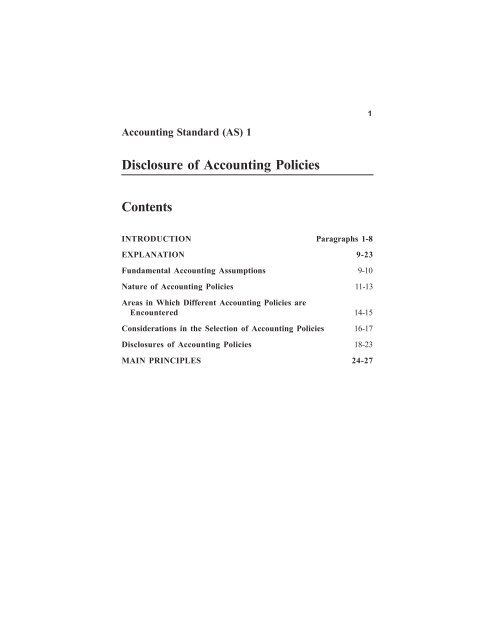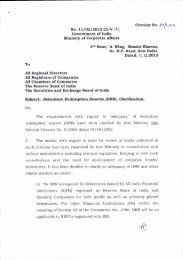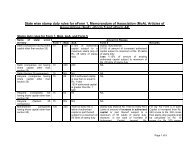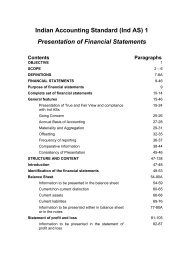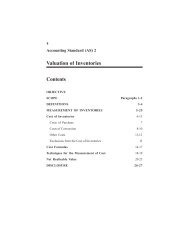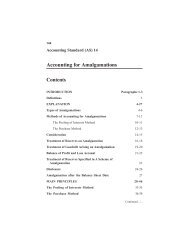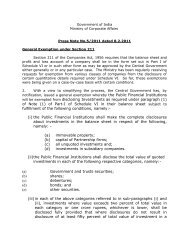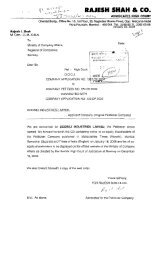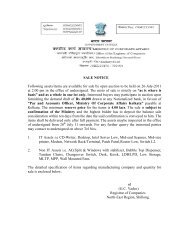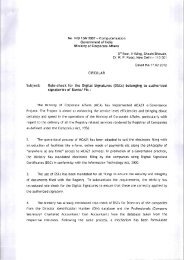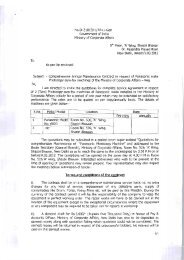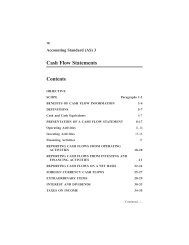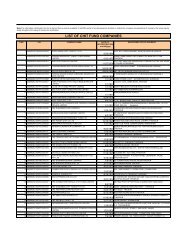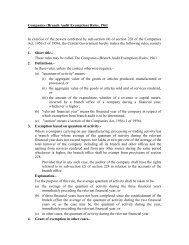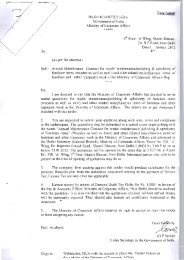(AS) 1 Disclosure of Accounting Policies - Ministry of Corporate Affairs
(AS) 1 Disclosure of Accounting Policies - Ministry of Corporate Affairs
(AS) 1 Disclosure of Accounting Policies - Ministry of Corporate Affairs
Create successful ePaper yourself
Turn your PDF publications into a flip-book with our unique Google optimized e-Paper software.
<strong>Accounting</strong> Standard (<strong>AS</strong>) 1<br />
<strong>Disclosure</strong> <strong>of</strong> <strong>Accounting</strong> <strong>Policies</strong><br />
Contents<br />
INTRODUCTION Paragraphs 1-8<br />
EXPLANATION 9-23<br />
Fundamental <strong>Accounting</strong> Assumptions 9-10<br />
Nature <strong>of</strong> <strong>Accounting</strong> <strong>Policies</strong> 11-13<br />
Areas in Which Different <strong>Accounting</strong> <strong>Policies</strong> are<br />
Encountered 14-15<br />
Considerations in the Selection <strong>of</strong> <strong>Accounting</strong> <strong>Policies</strong> 16-17<br />
<strong>Disclosure</strong>s <strong>of</strong> <strong>Accounting</strong> <strong>Policies</strong> 18-23<br />
MAIN PRINCIPLES 24-27<br />
1
36 <strong>AS</strong> 1 (issued 1979)<br />
<strong>Accounting</strong> Standard (<strong>AS</strong>) 1<br />
<strong>Disclosure</strong> <strong>of</strong> <strong>Accounting</strong> <strong>Policies</strong><br />
(This <strong>Accounting</strong> Standard includes paragraphs set in bold italic type<br />
and plain type, which have equal authority. Paragraphs in bold italic<br />
type indicate the main principles. This <strong>Accounting</strong> Standard should be<br />
read in the context <strong>of</strong> the General Instructions contained in part A <strong>of</strong><br />
the Annexure to the Notification.)<br />
Introduction<br />
1. This Standard deals with the disclosure <strong>of</strong> significant accounting policies<br />
followed in preparing and presenting financial statements.<br />
2. The view presented in the financial statements <strong>of</strong> an enterprise <strong>of</strong> its<br />
state <strong>of</strong> affairs and <strong>of</strong> the pr<strong>of</strong>it or loss can be significantly affected by the<br />
accounting policies followed in the preparation and presentation <strong>of</strong> the financial<br />
statements. The accounting policies followed vary from enterprise to<br />
enterprise. <strong>Disclosure</strong> <strong>of</strong> significant accounting policies followed is necessary<br />
if the view presented is to be properly appreciated.<br />
3. The disclosure <strong>of</strong> some <strong>of</strong> the accounting policies followed in the<br />
preparation and presentation <strong>of</strong> the financial statements is required by law in<br />
some cases.<br />
4. The Institute <strong>of</strong> Chartered Accountants <strong>of</strong> India has, in Standard issued<br />
by it, recommended the disclosure <strong>of</strong> certain accounting policies, e.g.,<br />
translation policies in respect <strong>of</strong> foreign currency items.<br />
5. In recent years, a few enterprises in India have adopted the practice <strong>of</strong><br />
including in their annual reports to shareholders a separate statement <strong>of</strong><br />
accounting policies followed in preparing and presenting the financial<br />
statements.<br />
6. In general, however, accounting policies are not at present regularly and<br />
fully disclosed in all financial statements. Many enterprises include in the<br />
Notes on the Accounts, descriptions <strong>of</strong> some <strong>of</strong> the significant accounting<br />
policies. But the nature and degree <strong>of</strong> disclosure vary considerably between
<strong>Disclosure</strong> <strong>of</strong> <strong>Accounting</strong> <strong>Policies</strong> 3<br />
the corporate and the non-corporate sectors and between units in the same<br />
sector.<br />
7. Even among the few enterprises that presently include in their annual<br />
reports a separate statement <strong>of</strong> accounting policies, considerable variation<br />
exists. The statement <strong>of</strong> accounting policies forms part <strong>of</strong> accounts in some<br />
cases while in others it is given as supplementary information.<br />
8. The purpose <strong>of</strong> this Standard is to promote better understanding <strong>of</strong><br />
financial statements by establishing through an accounting standard the<br />
disclosure <strong>of</strong> significant accounting policies and the manner in which<br />
accounting policies are disclosed in the financial statements. Such disclosure<br />
would also facilitate a more meaningful comparison between financial<br />
statements <strong>of</strong> different enterprises.<br />
Explanation<br />
Fundamental <strong>Accounting</strong> Assumptions<br />
9. Certain fundamental accounting assumptions underlie the preparation<br />
and presentation <strong>of</strong> financial statements. They are usually not specifically<br />
stated because their acceptance and use are assumed. <strong>Disclosure</strong> is necessary<br />
if they are not followed.<br />
10. The following have been generally accepted as fundamental accounting<br />
assumptions:—<br />
a. Going Concern<br />
The enterprise is normally viewed as a going concern, that is, as continuing<br />
in operation for the foreseeable future. It is assumed that the enterprise<br />
has neither the intention nor the necessity <strong>of</strong> liquidation or <strong>of</strong> curtailing<br />
materially the scale <strong>of</strong> the operations.<br />
b. Consistency<br />
It is assumed that accounting policies are consistent from one period to another.<br />
c. Accrual<br />
Revenues and costs are accrued, that is, recognised as they are earned or
4 <strong>AS</strong> 1<br />
incurred (and not as money is received or paid) and recorded in the financial<br />
statements <strong>of</strong> the periods to which they relate. (The considerations affecting<br />
the process <strong>of</strong> matching costs with revenues under the accrual assumption<br />
are not dealt with in this Standard)<br />
Nature <strong>of</strong> <strong>Accounting</strong> <strong>Policies</strong><br />
11. The accounting policies refer to the specific accounting principles and<br />
the methods <strong>of</strong> applying those principles adopted by the enterprise in the<br />
preparation and presentation <strong>of</strong> financial statements.<br />
12. There is no single list <strong>of</strong> accounting policies which are applicable to all<br />
circumstances. The differing circumstances in which enterprises operate in<br />
a situation <strong>of</strong> diverse and complex economic activity make alternative<br />
accounting principles and methods <strong>of</strong> applying those principles acceptable.<br />
The choice <strong>of</strong> the appropriate accounting principles and the methods <strong>of</strong><br />
applying those principles in the specific circumstances <strong>of</strong> each enterprise<br />
calls for considerable judgement by the management <strong>of</strong> the enterprise.<br />
13. The various Standards <strong>of</strong> the Institute <strong>of</strong> Chartered Accountants <strong>of</strong><br />
India combined with the efforts <strong>of</strong> government and other regulatory agencies<br />
and progressive managements have reduced in recent years the number <strong>of</strong><br />
acceptable alternatives particularly in the case <strong>of</strong> corporate enterprises. While<br />
continuing efforts in this regard in future are likely to reduce the number still<br />
further, the availability <strong>of</strong> alternative accounting principles and methods <strong>of</strong><br />
applying those principles is not likely to be eliminated altogether in view <strong>of</strong><br />
the differing circumstances faced by the enterprises.<br />
Areas in Which Differing <strong>Accounting</strong> <strong>Policies</strong> are Encountered<br />
14. The following are examples <strong>of</strong> the areas in which different accounting<br />
policies may be adopted by different enterprises.<br />
(a) Methods <strong>of</strong> depreciation, depletion and amortisation<br />
(b) Treatment <strong>of</strong> expenditure during construction<br />
(c) Conversion or translation <strong>of</strong> foreign currency items<br />
(d) Valuation <strong>of</strong> inventories<br />
(e) Treatment <strong>of</strong> goodwill
(f) Valuation <strong>of</strong> investments<br />
(g) Treatment <strong>of</strong> retirement benefits<br />
(h) Recognition <strong>of</strong> pr<strong>of</strong>it on long-term contracts<br />
(i) Valuation <strong>of</strong> fixed assets<br />
(j) Treatment <strong>of</strong> contingent liabilities.<br />
<strong>Disclosure</strong> <strong>of</strong> <strong>Accounting</strong> <strong>Policies</strong> 5<br />
15. The above list <strong>of</strong> examples is not intended to be exhaustive.<br />
Considerations in the Selection <strong>of</strong> <strong>Accounting</strong> <strong>Policies</strong><br />
16. The primary consideration in the selection <strong>of</strong> accounting policies by an<br />
enterprise is that the financial statements prepared and presented on the<br />
basis <strong>of</strong> such accounting policies should represent a true and fair view <strong>of</strong><br />
the state <strong>of</strong> affairs <strong>of</strong> the enterprise as at the balance sheet date and <strong>of</strong> the<br />
pr<strong>of</strong>it<br />
17. For this purpose, the major considerations governing the selection and<br />
application <strong>of</strong> accounting policies are:—<br />
a. Prudence<br />
In view <strong>of</strong> the uncertainty attached to future events, pr<strong>of</strong>its are not anticipated<br />
but recognised only when realised though not necessarily in cash. Provision<br />
is made for all known liabilities and losses even though the amount cannot be<br />
determined with certainty and represents only a best estimate in the light <strong>of</strong><br />
available information.<br />
b. Substance over Form<br />
The accounting treatment and presentation in financial statements <strong>of</strong><br />
transactions and events should be governed by their substance and not merely<br />
by the legal form.<br />
c. Materiality<br />
Financial statements should disclose all “material” items, i.e. items the<br />
knowledge <strong>of</strong> which might influence the decisions <strong>of</strong> the user <strong>of</strong> the financial<br />
statements.
6 <strong>AS</strong> 1<br />
<strong>Disclosure</strong> <strong>of</strong> <strong>Accounting</strong> <strong>Policies</strong><br />
18. To ensure proper understanding <strong>of</strong> financial statements, it is necessary<br />
that all significant accounting policies adopted in the preparation and<br />
presentation <strong>of</strong> financial statements should be disclosed.<br />
19. Such disclosure should form part <strong>of</strong> the financial statements.<br />
20. It would be helpful to the reader <strong>of</strong> financial statements if they are all<br />
disclosed as such in one place instead <strong>of</strong> being scattered over several<br />
statements, schedules and notes.<br />
21. Examples <strong>of</strong> matters in respect <strong>of</strong> which disclosure <strong>of</strong> accounting policies<br />
adopted will be required are contained in paragraph 14. This list <strong>of</strong> examples<br />
is not, however, intended to be exhaustive.<br />
22. Any change in an accounting policy which has a material effect should<br />
be disclosed. The amount by which any item in the financial statements is<br />
affected by such change should also be disclosed to the extent ascertainable.<br />
Where such amount is not ascertainable, wholly or in part, the fact should be<br />
indicated. If a change is made in the accounting policies which has no material<br />
effect on the financial statements for the current period but which is<br />
reasonably expected to have a material effect in later periods, the fact <strong>of</strong><br />
such change should be appropriately disclosed in the period in which the<br />
change is adopted.<br />
23. <strong>Disclosure</strong> <strong>of</strong> accounting policies or <strong>of</strong> changes therein cannot remedy<br />
a wrong or inappropriate treatment <strong>of</strong> the item in the accounts.<br />
Main Principles<br />
24. All significant accounting policies adopted in the preparation and<br />
presentation <strong>of</strong> financial statements should be disclosed.<br />
25. The disclosure <strong>of</strong> the significant accounting policies as such should<br />
form part <strong>of</strong> the financial statements and the significant accounting<br />
policies should normally be disclosed in oneplace.<br />
26. Any change in the accounting policies which has a material effect<br />
in the current period or which is reasonably expected to have a material
<strong>Disclosure</strong> <strong>of</strong> <strong>Accounting</strong> <strong>Policies</strong> 7<br />
effect in later periods should be disclosed. In the case <strong>of</strong> a change in<br />
accounting policies which has a material effect in the current period,<br />
the amount by which any item in the financial statements is affected by<br />
such change should also be disclosed to the extent ascertainable. Where<br />
such amount is not ascertainable, wholly or in part, the fact should be<br />
indicated.<br />
27. If the fundamental accounting assumptions, viz. Going Concern,<br />
Consistency and Accrual are followed in financial statements, specific<br />
disclosure is not required. If a fundamental accounting assumption is<br />
not followed, the fact should be disclosed.


